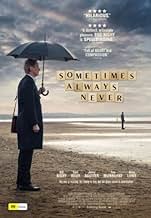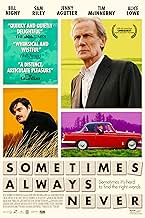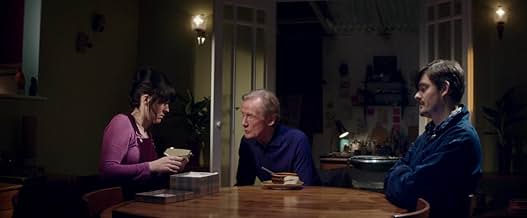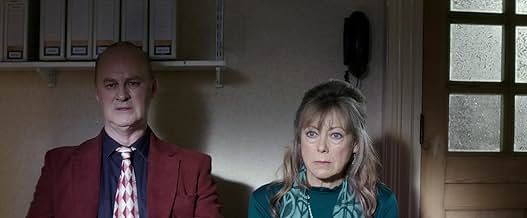IMDb रेटिंग
6.3/10
3.5 हज़ार
आपकी रेटिंग
एक जासूसी फंतासी / पारिवारिक नाटक जहां शब्दों का प्यार एक पिता को एक लापता बेटे के साथ फिर से जुड़ने में मदद करता है।एक जासूसी फंतासी / पारिवारिक नाटक जहां शब्दों का प्यार एक पिता को एक लापता बेटे के साथ फिर से जुड़ने में मदद करता है।एक जासूसी फंतासी / पारिवारिक नाटक जहां शब्दों का प्यार एक पिता को एक लापता बेटे के साथ फिर से जुड़ने में मदद करता है।
- पुरस्कार
- कुल 1 जीत
फ़ीचर्ड समीक्षाएं
Just to address the marmite topic brought up by another reviewer: It was illustrated in the film that Billy Nighy's character Alan was not a reliable story teller. He liked to tell tall tales, like the one about the grandmother with the coal seam in the basement.
Going back to the movie, I thought it was quirky like everyone mentioned. I knew it wasn't going to be a straight forward dramedy based on the bizarre, artificial riding in car scenes. It looked like it was done in a 1950s B movie style.
Thankfully the movie dials back on that and delivers a fairly straight forward, drama comedy framed around the game of scrabble, but really about Alan and his son Peter, as they try to solve the mystery of the missing son Michael. The body viewing scene (which we don't see) was particularly odd, because we were told that Michael went missing many many years ago when he and Peter were still children. So why would they be called to identify a body? If it was an adult's body, how would they know it was him. Usually they do DNA tests anyway.
Other than that weird start, and some scene involving a boat (or did it?), much of the movie follows a fairly linear format. I think it helps that every character in the movie had something to offer the movie, and generally everyone was likeable. You kind of hoped there would be a resolution of the 'mystery', but ultimately it didn't really matter. Nothing is really 'solved' by the ending, except maybe Peter wasn't as resentful of his missing brother's 'Prodigal Son' stature, and maybe Alan realized it was time to focus on his existing family.
A single delicious narrative conceit drives the delightful Sometimes. Always. Never. (2018). It takes its own sweet time getting there, but when it does, it hits home: you can be an expert in words and their rules but be incapable of meaningful expression. Add a Scrabble obsession, mix it with deep grief and guilt, and you have a portrait of a family desperately unable to communicate with each other.
The simplicity of the plotline stands in stark contrast to the complexity of its themes. Dapper rule-bound tailor Alan (Bill Nighy) is told that the body of his long-missing son Michael may have been found. He takes his younger estranged son Peter (Sam Riley) with him to identify the body, and at the morgue they meet other parents who are there for the same reason. It's a diversion that does little to advance the narrative, but it does provide comic respite from the pain of loss. Both relieved and disappointed with the outcome, Alan invites himself to stay with Peter and his family in the hope of reconciliation.
With a threadbare plot, the power of this film comes from its theatrical settings, intelligent banter, and Nighy's trademark whimsical mannerisms and stylised performance. The label 'fantasy drama' has been applied to this film but is mis-leading and manifestly inadequate. If there is an element of fantasy, it derives from the way many scenes are played out against backgrounds that are have a surreal, even an absurdist two-dimensional feel that resembles a theatre set. Like all absurdism, there is an artful space between the underlying emotional intensity and the futility of ever trying to understand it. The gravelly Nighy is a master of under-statement, with a unique talent for giving shallow dialogue depth and humour. It's all about contrasts: Alan's obsession with a missing son and neglect of the son he still has; his fastidious Dymo labelling of everything as a substitute for control in his world; and his ability to make light of the heaviest emotions.
If you are not a Nighy fan or prefer action-based stories, you may find little to appreciate in this film. In place of a forward-moving narrative it offers a portrait of a dysfunctional family torn apart over guilt and the inability to emotionally connect. The film's title is itself a parody of form over function, referring to the tailor's rule for how jacket buttons should be fastened: the top always, the middle sometimes, the bottom never. With no substantive relationship to the film's content, it's a rule as good as any on how to live one's life.
The simplicity of the plotline stands in stark contrast to the complexity of its themes. Dapper rule-bound tailor Alan (Bill Nighy) is told that the body of his long-missing son Michael may have been found. He takes his younger estranged son Peter (Sam Riley) with him to identify the body, and at the morgue they meet other parents who are there for the same reason. It's a diversion that does little to advance the narrative, but it does provide comic respite from the pain of loss. Both relieved and disappointed with the outcome, Alan invites himself to stay with Peter and his family in the hope of reconciliation.
With a threadbare plot, the power of this film comes from its theatrical settings, intelligent banter, and Nighy's trademark whimsical mannerisms and stylised performance. The label 'fantasy drama' has been applied to this film but is mis-leading and manifestly inadequate. If there is an element of fantasy, it derives from the way many scenes are played out against backgrounds that are have a surreal, even an absurdist two-dimensional feel that resembles a theatre set. Like all absurdism, there is an artful space between the underlying emotional intensity and the futility of ever trying to understand it. The gravelly Nighy is a master of under-statement, with a unique talent for giving shallow dialogue depth and humour. It's all about contrasts: Alan's obsession with a missing son and neglect of the son he still has; his fastidious Dymo labelling of everything as a substitute for control in his world; and his ability to make light of the heaviest emotions.
If you are not a Nighy fan or prefer action-based stories, you may find little to appreciate in this film. In place of a forward-moving narrative it offers a portrait of a dysfunctional family torn apart over guilt and the inability to emotionally connect. The film's title is itself a parody of form over function, referring to the tailor's rule for how jacket buttons should be fastened: the top always, the middle sometimes, the bottom never. With no substantive relationship to the film's content, it's a rule as good as any on how to live one's life.
It is a joy to watch it. First, because of its style of shooting and second, because of its clear and rich colors. It looks as an brilliant school of art, designed precisely. On the other hand it is a good story, done in some traditional and emotional way, and who is playing in. Bill Nighy is as always excellent, elegant and charming.
What a clever quirky little movie that proves when done well the British succeed where other fail.
No plot or spoilers here as it would ruin the movie but all the performances headed by Bill Nighy as Alan are superb. Bill Nighy plays droll eccentric old men better than anyone I can think of I can't imagine anyone else doing justice to this role. The last time I saw Bill Nighy in a movie was The Bookshop and even though it was not the starring role ,he played an almost Dickensian character he stole that movie
The only thing I'll say about the story is that it's about two families,both have suffered loss and both are bought together by the game of Scrabble.
The supporting cast of Sam Riley as Peter Alan's son and Jenny Agutter ,(out of habit as Sister Jullienne) well and truly in this film plays Margaret touchingly and with great humour ,this is a very funny movie ,almost a comedy but with a lot of pathos Tim McInnerny as Margaret 's droll husband is also very good. Also the rest of the cast Alice Lowe ,as Peters wife and Oliver Sindcup as young Peter are very very good.
Frank Cottrell Boyce ,who wrote screenplays for Goodbye Christopher Columbus ,Railway Man,and Hillary and Jackie among other films and television is one of the most respected writers for the British screen and it's easy to understand why.
I don't know much about director the Carl Hunter but if Sometimes Always Never is an example of his directing I hope to see more of his movies.
Don't miss this one.
No plot or spoilers here as it would ruin the movie but all the performances headed by Bill Nighy as Alan are superb. Bill Nighy plays droll eccentric old men better than anyone I can think of I can't imagine anyone else doing justice to this role. The last time I saw Bill Nighy in a movie was The Bookshop and even though it was not the starring role ,he played an almost Dickensian character he stole that movie
The only thing I'll say about the story is that it's about two families,both have suffered loss and both are bought together by the game of Scrabble.
The supporting cast of Sam Riley as Peter Alan's son and Jenny Agutter ,(out of habit as Sister Jullienne) well and truly in this film plays Margaret touchingly and with great humour ,this is a very funny movie ,almost a comedy but with a lot of pathos Tim McInnerny as Margaret 's droll husband is also very good. Also the rest of the cast Alice Lowe ,as Peters wife and Oliver Sindcup as young Peter are very very good.
Frank Cottrell Boyce ,who wrote screenplays for Goodbye Christopher Columbus ,Railway Man,and Hillary and Jackie among other films and television is one of the most respected writers for the British screen and it's easy to understand why.
I don't know much about director the Carl Hunter but if Sometimes Always Never is an example of his directing I hope to see more of his movies.
Don't miss this one.
A very surreal looking film. Interesting colours and tones and deliberate filming car scenes over a filmed background.
In essence it is about relationships and long-term grief ... and scrabble.
It is worth a watch.
In essence it is about relationships and long-term grief ... and scrabble.
It is worth a watch.
क्या आपको पता है
- ट्रिवियाThe film is based on a short story called Triple Word Score, written by the script writer Frank Cottrrel Boyce.
- गूफ़When Alan claims that "jazz" is a high-scoring word in Scrabble, a character corrects him by stating it's impossible to play since there's only one Z tile in the set. In reality, this word is indeed playable using "wild card" tiles. If using J, A, and Z tiles and a wild card tile in place of the other Z, the word would be a high-scoring word worth a minimum of 19 points.
- कनेक्शनFeatured in Projector: Sometimes Always Never (2019)
- साउंडट्रैकSometimes Always Never
Written by Edwyn Collins and Sean Read
Performed by Edwyn Collins, Sean Read and Chay Heney
टॉप पसंद
रेटिंग देने के लिए साइन-इन करें और वैयक्तिकृत सुझावों के लिए वॉचलिस्ट करें
- How long is Sometimes Always Never?Alexa द्वारा संचालित
विवरण
- रिलीज़ की तारीख़
- कंट्री ऑफ़ ओरिजिन
- आधिकारिक साइट
- भाषा
- इस रूप में भी जाना जाता है
- Triple Word Score
- फ़िल्माने की जगहें
- उत्पादन कंपनियां
- IMDbPro पर और कंपनी क्रेडिट देखें
बॉक्स ऑफ़िस
- US और कनाडा में सकल
- $39,191
- US और कनाडा में पहले सप्ताह में कुल कमाई
- $2,599
- 14 जून 2020
- दुनिया भर में सकल
- $14,17,047
- चलने की अवधि1 घंटा 31 मिनट
- रंग
- पक्ष अनुपात
- 2.35 : 1
इस पेज में योगदान दें
किसी बदलाव का सुझाव दें या अनुपलब्ध कॉन्टेंट जोड़ें
































